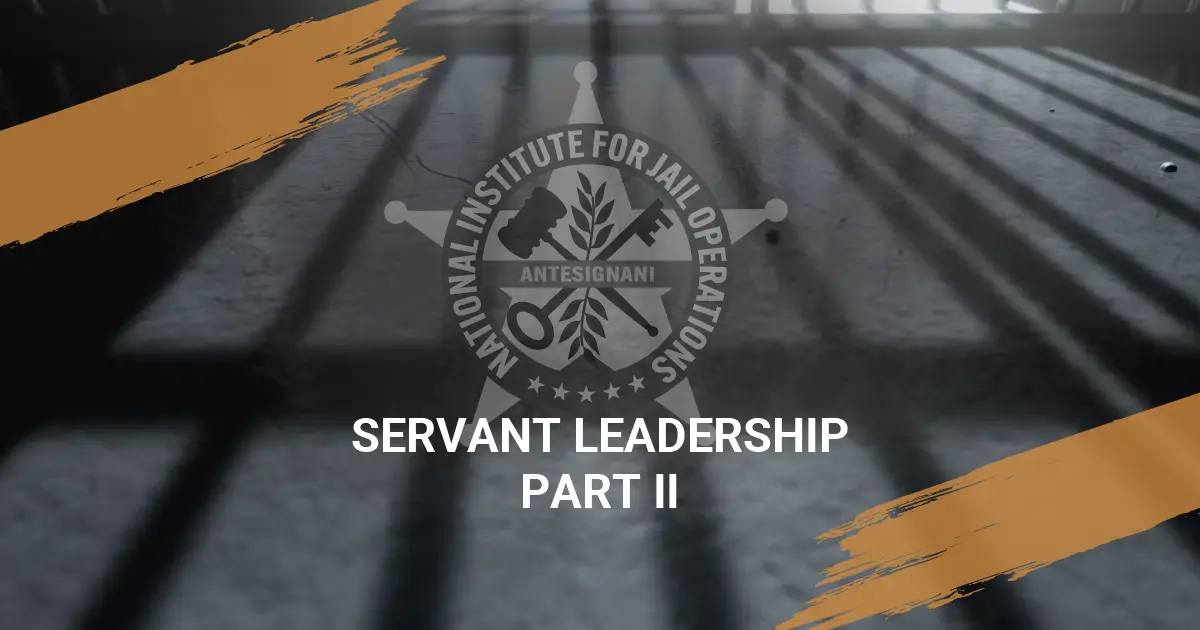We left off at the end of Servant Leadership: What It Is and Why It Matters to Your Future with, “Become a successful steward to those entrusted to your care. Seek out alternatives to the status quo and always question to see if there is a better way. Don’t ever stop learning how to develop new opportunities for yourself and for others within your organization.” Let’s take that to another level.
Effective servant leadership has some basic underlying principles. One of those principles is to be a servant first. “When leaders accept that they are servants first, then they clearly know where they stand. And it’s not at the head of the line.”[i] As a Facility Training Officer, Mentor, Supervisor, Sergeant, Manager, Lieutenant, Commander, or any other position of leadership within your organization, you owe it to your peers, your subordinates and to the organization to become a student of your profession. You must invest in yourself to develop others. “The best way to learn something is to teach it to somebody else.”[ii] To become a student of your profession you must take it to heart. Learn more, so you can teach more.
Leaders set the example of sharing information with others beyond just task completion. “One of the most powerful legacies you can leave is to turn every person you lead…into a teacher.”[iii] Teaching is one way of serving. The best leaders are teachers and the best teachers are active learners. If A=B, and B=C, logic will suggest that the best leaders are also active learners, A must equal C! There are a lot of people in line with you and it’s your responsibility to pass along as much information as you can to prepare them for a successful career. How do we ensure that we pass along the information to our staff? We approach it from a new perspective.
Simon Sinek published a book in 2009, Start with Why: How Great Leaders Inspire Everyone to Take Action. He describes how understanding “why” can inspire us and others. We have all had a trainer that taught us “what” and “how” to do a task,and learning the task was essential to the function at the time. Few of us had a trainer that taught us “how” to do a task and “why” we do it a specific way. Understanding the “why” will help us teach others the reasoning behind the task and the appropriate way to complete the task. What is the rationale behind the task? Is this a best practice? What purpose does it serve? Is it legally based? Learning “what” and “how” without “why” always leaves us with “why do we do this,why do we do that?” And the most common response is, “because we’ve always done it that way.” Not knowing “why” we do something will allow for people to cut corners or skip required steps because they don’t understand the rationale and this leads to inconsistency.
A good trainer will teach you “why” and “why” is essential. Start with, “why” do we conduct strip searches? It reduces contraband, life-safety hazards, weapons, gambling, inmate conflicts and also keeps your staff, inmates and the community safe. Look at the rationale, the history of the case law, your agency protocol and then teach others “what” the best practices are for strip searches in your facility and “how” to accomplish the task.
How do we adapt “why” into our workplace? Consider your mission. In your agency it might be to protect and to serve, to preserve life, prevent escape, to help others etc. That is the “what” of our jobs. The Mission at our Sheriff’s Office is: “We are committed to providing responsive and effective Service to the Community. We earn and maintain the public’s trust and confidence through our integrity and professionalism. We fulfill this commitment by developing professional staff, establishing partnerships within our community, and dedicating our resources and skills to these efforts.”[iv]
Our “what” is to provide Service to the Community. Our “how” is developing staff, establishing partnerships and dedicating our resources and skills. Our “why” is to earn and maintain the public’s trust and confidence. We are much more successful when we focus on having an excellent relationship with our community. We all know how difficult our jobs can be when that relationship is jeopardized. Could we educate our staff first with the “why” of the Mission,then “how” and finally “what”? Yes, one builds upon another. Could we use this to socialize a new employee? “We must earn and maintain the public’s trust in all that we do with integrity and professionalism. We will help develop you and other staff to establish partnerships and dedicate our resources to provide responsive and effective Service to the Community.” Don’t forget this is “why” we are working in this profession in the first place.
Here is an illustration from Sinek. Look at the 3 circles. The outermost circle is “what” and I would bet 100% of people know what we do. The middle circle is “how” and probably 90% know how we do it. The innermost circle is “why”, how many know the “why” of what we do? Our focus seems to always be on “what” and not “why”. What if we redirected our attention to “why”, if we apply this theory to all aspects of our work; recruiting, hiring, training, processing inmates for booking or release, automating a function, headcounts, budgeting, direct supervision/community policing and strategic planning? The examples are endless. As Simon points out very clearly, people don’t buy what you do they buy why you do it.[v]

Most of us think from the outside – in, from “what” we do, to “how”, and only then, “why”. We generally progress from the clearest thing to the haziest. Consider this, if we don’t learn “why”, how do we get others to focus their attention on the importance of “why”? We can’t. What if we turned it around like the example of the mission above? What if we start with “why” and work to “what”? Inspired leaders believe in challenging the status quo, they believe in thinking differently about the “why”, which influences “how” and “what” we do.
What if we used a more natural path to individual learning, if we appealed directly to the part of the brain associated with feelings, trust and loyalty? Could we improve in our recruiting efforts, positively impact our training programs, how we process our bookings and releases, our automation, and also provide better customer service? By training directly to the part of the brain that controls human behavior we help to rationalize what we say and do. By training at a cognitive “why” level instead of an operational “how” level you involve different parts of the brain allowing for better retention.
Recruiting and hiring begins with a detailed application process, followed by testing; written-oral board-physical agility, and then a thorough background, then a polygraph and/or psychological exam. Maybe even a final interview with command staff. After all of this, have we found a qualified candidate and future leader? Yes. Can we still fail at developing them into an exceptional employee? Yes, if, we focus our training on “what” and continue to neglect “why”. Sinek says… “If you hire people who need a job, they will work for money.” But, employees that believe in the “why” of your organization will work for you with their blood sweat and tears. We don’t follow leaders because we have to. We follow, not for them but, for ourselves. We follow the inspirational leaders. We follow the leaders that teach “why”.[vi]
Become a successful steward to those entrusted to your care.
Become a student of your profession. Learn, know, and teach WHY.
[i] Kouzes, James A. and Posner, Barry Z. A Leader’s Legacy. San Francisco: Jossey-Bass, 2006. pg 16.
[ii] Ibid, pg 21.
[iii] Ibid, pg 24.
[iv] Pribil, Bill. “Sheriff’s Office,Mission – Service to Community”. Jan, 2005. Coconino County, AZ. http//www.coconino.az.gov/index.aspx?nid=325
[v] Sinek, Simon, “How great leaders inspire action.” May, 2010. TED – Ideas worth spreading. www.ted.com/talks/simon_sinek_how_great_leaders_inspire_action.html
[vi] Ibid.



